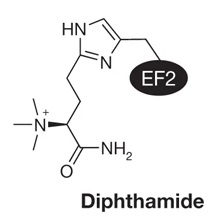Diphthamide Proteomics Service
Diphthamide Proteomics Service is a comprehensive analytical service based on advanced technologies such as high-resolution mass spectrometry and nuclear magnetic resonance (NMR), specifically designed for the analysis of diphthamide modifications. This service aims to identify and quantify diphthamide modification sites on proteins, uncover their dynamic changes under various physiological and pathological conditions, and support researchers in gaining deeper insights into their biological functions and potential clinical relevance.

Zhang Y. et al. Nature. 2010.
Diphthamide is a highly conserved post-translational modification synthesized through the reaction of histidine with S-adenosylmethionine (SAM), and is found on translation elongation factor 2 (EF2) in eukaryotes and archaea. The modification is named after its specific targeting by a toxin produced by Corynebacterium diphtheriae, which catalyzes ADP-ribosylation of the imidazole ring of diphthamide. This modification inactivates EF2, thereby blocking peptide chain elongation and ultimately leading to cell death. Studies have shown that diphthamide plays critical roles not only in protein synthesis, cell cycle progression, and transcriptional regulation, but also in the development of diseases such as cancer and neurodegenerative disorders. Therefore, in-depth investigation of diphthamide modification is essential for understanding mechanisms of translational regulation and disease pathogenesis.
Leveraging advanced platforms such as high-resolution mass spectrometry and NMR, MtoZ Biolabs offers Diphthamide Proteomics Service to accurately identify and quantify diphthamide modification sites. This service enables systematic analysis of the dynamic changes of diphthamide under various biological conditions, facilitating insights into its roles in translational regulation, disease progression, and therapeutic intervention, and supporting the discovery of its critical functions in cellular processes and pathological mechanisms.
Analysis Workflow
The analytical workflow of Diphthamide Proteomics Service includes the following key steps:
1. Sample Preparation
Total proteins are extracted from cells or tissues.
2. Proteolytic Digestion
Proteins are digested into peptides using enzymes such as trypsin.
3. Enrichment of Modified Peptides
Peptides containing diphthamide modifications are enriched using immunoaffinity or chemical labeling methods.
4. Mass Spectrometry Analysis
High-resolution LC-MS/MS is used to identify and quantify the modified peptides.
5. Data Analysis and Reporting
Specialized software is used to analyze the mass spectrometry data, localize diphthamide modification sites, assess abundance changes, and generate a detailed analytical report.
Service Advantages
1. Advanced Analysis Platform: MtoZ Biolabs established an advanced Diphthamide Proteomics Service platform, guaranteeing reliable, fast, and highly accurate analysis service.
2. One-Time-Charge: Our pricing is transparent, no hidden fees or additional costs.
3. High-Data-Quality: Deep data coverage with strict data quality control. AI-powered bioinformatics platform integrates all Diphthamide Proteomics Service data, providing clients with a comprehensive data report.
4. Customized Service: Tailored experimental design and analysis plans are available based on the specific research needs of the client.
Sample Submission Suggestions
MtoZ Biolabs accepts a variety of sample types, including but not limited to:

Please avoid samples containing high concentrations of salts, detergents, or strong reducing agents. We recommend confirming the sample preparation protocol with our technical team in advance. All samples should be shipped on dry ice and protected from repeated freeze–thaw cycles.
MtoZ Biolabs offers customized sample preparation guidance and pretreatment services. Please feel free to contact us for detailed support.
Applications
Application examples of Diphthamide Proteomics Service:
Protein Translation Regulation Research
Investigate the role of diphthamide modification in the regulation of protein synthesis.
Drug Development
Evaluate the effects of candidate compounds on diphthamide modification to support drug screening and mechanism-of-action studies.
Biomarker Discovery
Identify potential biomarkers for early diagnosis and prognosis by quantitatively analyzing diphthamide modification levels.
Deliverables
1. Comprehensive Experimental Details
2. Materials, Instruments, and Methods
3. Total Ion Chromatogram & Quality Control Assessment (project-dependent)
4. Data Analysis, Preprocessing, and Estimation (project-dependent)
5. Bioinformatics Analysis
6. Raw Data Files
Related Services
Post-Translational Modifications Proteomics Service
Quantitative Phosphoproteomics Service
Quantitative Acetylproteomics Service
Protein Disulfide Bonds Identification and Quantitative Analysis
How to order?







